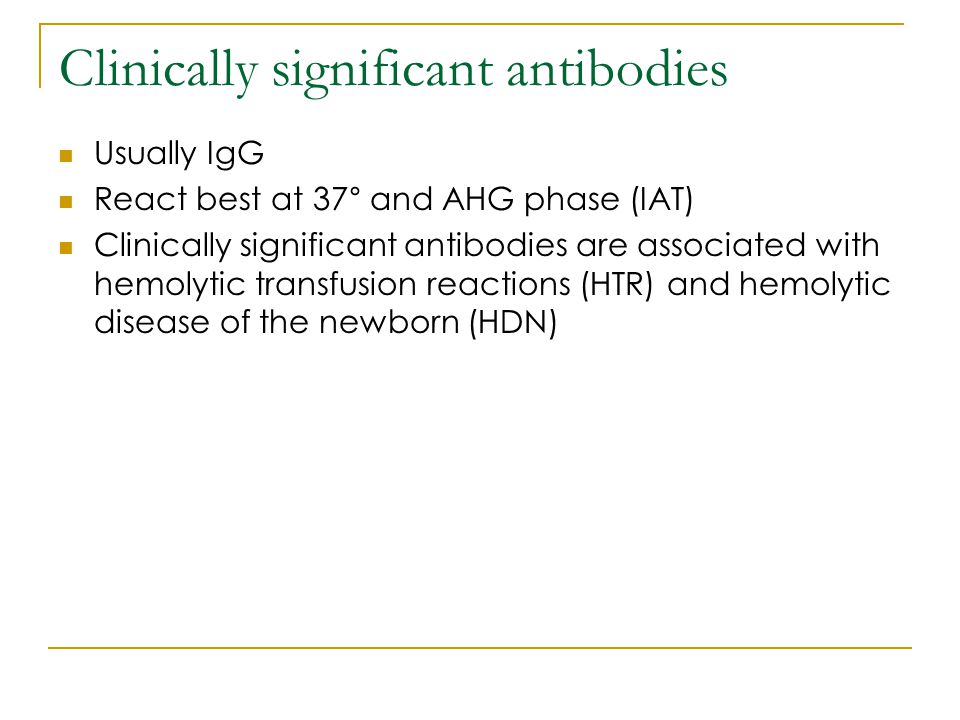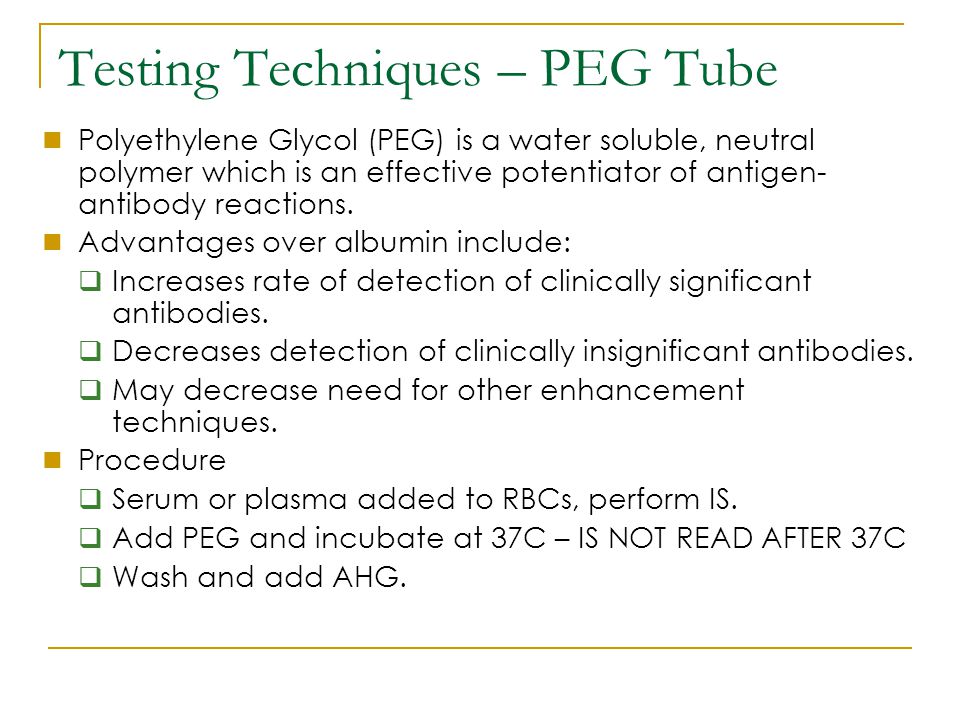Clinically Significant Antibodies React Best at Which Phase of Testing
These reactions disappeared following incubation at 37 C and the antihuman globulin phase of testing. IgG antibodies that react best at 37 degrees an require the use of antihuman globulin sera Coombs sera for detection.

Antibody Detection Mohammed Jaber Ppt Video Online Download
Most clinically significant antibodies will react at the AHG phase and some may react at 37 o C as well.

. Antibodies must be identified so that appropriate blood products are selected for transfusion and the risk of adverse reaction is minimized. Our Antibody Detection and Identification course will guide you through the processes that will help you to expose the antibody that is the culprit. Clinically significant antibodies react BEST at which phase of testing.
Donors who test negative at immediate spin and positive after IAT are considered. The optimum temperature depends on the type of antibody involved. Historically Rh antibodies have been the major cause of severe.
Screening Cells have known antigens for the common clinically significant antibodies. Which clinically significant antibodies react at 37 degrees. A term used to describe the fact that a particular blood group antibody can cause one of two problems.
With column gel agglutination see Methods the procedure varies by the type of test to. 1 review of the patients. If antibody screen positive must do additional tests to specifically identify antibody.
Antibodies must be identified so that appropriate blood products are selected for transfusion and the risk of adverse reaction is minimized. Clinically significant antibodies are capable of causing transfusion reactions. It is known that antigens of the MNS blood group system are sensitive to treatment with enzymes such as papain and ficin as these enzymes cleave the red cell membrane sialoglycoproteins at well-defined sites.
The antigens accessibility is also important since the antibodies must be able to reach antigens. Our Antibody Detection and Identification course will guide you through the processes that will help you to expose the antibody that is the culprit. IgG antibodies typically react at or near body temperature 37 C and are more likely to damage.
They also react in albumin phases and if IgM can react in saline phases also. It provides flexible and useful method for semi quantitating of either antigen or antibody concentration. Complement Binding Rh alloantibodies do not usually bind complement.
GGLUTINATION TEST It is one of important laboratory method to detect antigen antibody reaction. Antibodies reactive at either 37 C or in the AHG test phase are more likely to be clinically significant Other Definitions Shortened RBC survival Laboratory evidence of hemolysis increased bilirubin levels LDH Clinical signs of hemolytic transfusion reaction Jaundice Shortened RBC survival Activating complement leading to intravascular or Extravascular hemolysis by. Readings can be done at all three phases if a tube method is used.
The antibody most likely to be responsible is. Consist of reagent antibody of known specificity fixed to the microplate wells with the addition of RBCs with unknown antigen. This process is really just an indirect antiglobulin Coombs test.
Hemolytic disease of the fetusnewborn HDFN Most significant antibodies are IgG antibodies rather than IgM. If a gel method or solid phase is used readings are done only at AHG. Thus anti-M antibody is not considered to be clinically significant but when found reactive at 37C or at AHG phase it should be considered clinically significant.
IgM react best at 4 o C. In general the clinically significant antibodies are those reactive at 37C in vitro andor those reactive in the indirect antiglobulin test IAT phase and are. You need to incubate long enough to reach equilibrium but not too long.
Attach screening cell sheet If there is agglutination after Coombs step with either or both Screening Cells patient has an unexpected antibody. AHGIATCoombs they all mean the same thing Clinically significant antibodies usually IgG are associated with __ and __. IgG antibodies react best at __C.
The last 2 phases 37C and AHG phases are necessary to detect clinically significant IgG antibodies. The reaction will results in forming aggregate or agglutinate. The reaction occurs between insoluble particulateantigen and appropriate antibody.
There is a requirement to perform the D typing through the indirect antiglobulin phase IAT. The general process for antibody identification includes eight key steps. Direct Solid Phase Test.
IgG antibodies react best at 37 o C. Clinically Significant Antibodies Alloantibodiesto RBC antigens that react at 37 C and are capable of causing Hemolytic Transfusion reactions decreased survival of transfused RBCs or Hemolytic Disease of the Fetus and Newborn. Antibody screens use a patients plasma against reagent __ to detect antibodies.
And can be clinically significant if they react at 37C or in the antihuman globulin AHG phase. Clinically significant antibodies Usually IgG React best at 37 C and AHG phase IAT Clinically significant antibodies are associated with hemolytic transfusion reactions HTR and hemolytic disease of the newborn HDN. This meets AABB Standards 6.
Such reagent cells are selected because they carry the blood group antigens necessary for detecting the most important clinically significant RBC alloantibodies namely those antibodies reactive at 37 degrees Celsius and in the AHG phase of crossmatching as opposed to those reactive at room temperature. IgG antibodies react best during which phase. In the process of identifying an antibody the technologist observed 2 reactions with 3 of the 10 cells in a panel at the immediate spin phase.
37 C incubation. Clinically significant antibodies that are capable of causing acute and delayed hemolytic transfusion reactions HTR or hemolytic disease of the newborn HDN are usually IgG and react best in the AHG phase. Immediate spin IS B.
Clinically significant antibodies are capable of causing. Phases of Reactivity Rh antibodies react best of all in enzyme phases and also react well in the antiglobulin phase.

Practical Blood Bank Antibody Screening Lab Ppt Video Online Download

Hemolytic Disease Of The Newborn Hdfn Flashcards Quizlet

Practical Blood Bank Antibody Screening Lab Ppt Video Online Download

Practical Blood Bank Antibody Screening Lab Ppt Video Online Download
No comments for "Clinically Significant Antibodies React Best at Which Phase of Testing"
Post a Comment